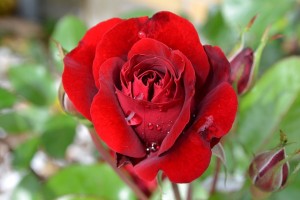rosy, bright, rose-coloured
[adjective]
[roos-kleu-rig] ![]()
 The literal translation of ‘rooskleurig’ is ‘rose-coloured’. Perhaps because there is no unique colour for roses, one encounters ‘rooskleurig’ more often in the figurative meaning of ‘reflecting optimism’, e.g. ‘een rooskleurige toekomst’: a bright future.
The literal translation of ‘rooskleurig’ is ‘rose-coloured’. Perhaps because there is no unique colour for roses, one encounters ‘rooskleurig’ more often in the figurative meaning of ‘reflecting optimism’, e.g. ‘een rooskleurige toekomst’: a bright future.
‘Rooskleurig’ is composed of the noun ‘roos’ and the adjective ‘kleurig’. The latter is not used often; in case of ‘many colours’ one rather uses ‘kleurrijk’, see the Related words below.
Examples:
– “Hoe gaat het met je?” – “Goed, heel erg goed kan ik wel zeggen; de toekomst ziet er rooskleurig uit!”
(“How are you doing/feeling?” – “Fine/good, very good I may (even) say; the future is looking bright!”)
– “De vooruitzichten voor economisch herstel zijn allesbehalve rooskleurig te noemen.”
(“The prospects for economic recovery can be described as all but bright/rosy.”)
– “We hebben veel tegenslagen moeten verwerken, maar we zien de doorstart van ons bedrijf rooskleurig tegemoet.”
(“We have had to deal with many setbacks, but we await the new startup of our company in good spirits.” Note the use of the word ‘doorstart’; when a company goes bankrupt, however somehow manages to start over again shortly after bankruptcy (often in a different form), in Dutch this is called a ‘doorstart’. It’s derived from a plane aborting the landing just before it has reached the runway.)
Related words:
– Roos: rose [noun] [de roos, de rozen].
– Kleur: colour [noun] [de kleur, de kleuren].
– Kleurig: colourful, full-coloured [adjective].
– Kleurrijk: colourful [adjective]. Contrary to ‘kleurig’, the adjective ‘kleurrijk’ can also be used figuratively, e.g. to describe a person’s character.
– Florissant: blooming, thriving [adjective]. One often encounters the negation: ‘Het ziet er niet florissant uit.’
– Fleurig: blooming, colourful [adjective]. Also figuratively in the meaning of ‘cheerful’.
Things to remember from this DWOTD
– The usage of ‘kleurig’ vs. ‘kleurrijk’;
– The meaning of ‘allesbehalve’;
– In which circumstances do the Dutch use the word ‘doorstart’.
